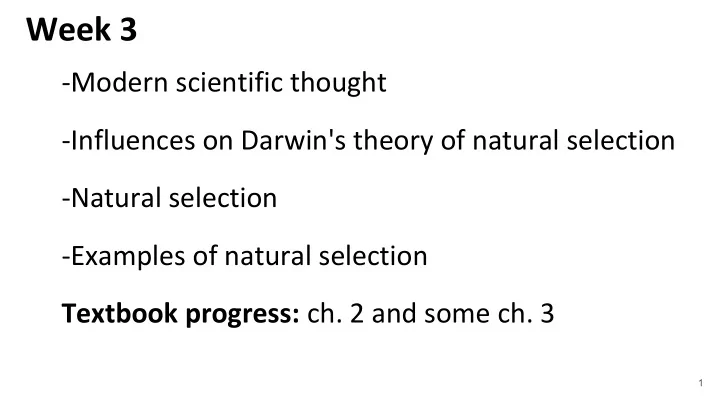

Week 3 -Modern scientific thought -Influences on Darwin's theory of natural selection -Natural selection -Examples of natural selection Textbook progress: ch. 2 and some ch. 3 1
https://www.lbcc.edu/post/notetakers Office hours: T-Th, 12-1pm 2
3
Pre-scientific thinking Common views before the 18th century Fixity of species Young Earth 4
Pre-scientific thinking Changes before the 18th century -discovery of the New World -new tools (e.g., telescope) -heliocentrism 5
Precursors to evolutionary theory John Ray: species : a group of organisms that are reproductively isolated Carolus Linnaeus: binomial nomenclature E.g., Homo sapiens = Genus species
Precursors to evolutionary theory Georges-Louis Buffon: posited a correlation between changes in the environment and changes in an organism 7
Precursors to evolutionary theory Jean-Baptiste Lamarck: emphasized organism-environment interaction First to try and explain evolution... Inheritance of acquired characteristics -traits altered through use or disuse -altered traits are inherited 8
Precursors to evolutionary theory Jean-Baptiste Lamarck: emphasized organism-environment interaction First to try and explain evolution with: Inheritance of acquired characteristics -traits altered through use or disuse -altered traits are inherited Problem: says traits are altered during the lifetime of an individual 9
Georges Cuvier: tried to explain geology with catastrophism -first to say species go extinct Charles Lyell: Uniformitarianism explains geology points to an old Earth https://youtu.be/o_wmulBtWlk 10
11
Thomas Malthus: populations grow exponentially but resources grow linearly -leads to competition for resources 12
Charles Darwin (1809-1882) -learned about Lamarck, Buffon, etc. -BFFs with Lyell -a 5-year voyage around the world inspired his theory of natural selection 13
Natural selection: artificial selection analogy Artificial selection -All dogs share a common ancestor -Explains the extreme variation between breeds 14
Natural selection in detail - Eight processes Individuals with favorable traits have higher reproductive success compared to individuals with less favorable traits. (1) all species produce offspring faster than the food supply (2) there's biological variation in all species (3) each generation more offspring are born than survive 15
Natural selection in detail - Eight processes (4) more favorable traits lead to more fit individuals (5) environment determines which traits are favorable (6) traits are inherited and passed on to yield greater reproductive success 16
Natural selection in detail - Eight processes (7) over time, changes accumulate leading to new species (8) geographical isolation leads to new species through selective pressure https://youtu.be/hOfRN0KihOU?t=399 17
Important terms for evolution by natural selection Reproductive success: # of reproductively viable offspring produced Fitness: relative measure of reproductive success Selective pressures: environmental factors determining reproductive success. https://youtu.be/Uf-mOCN7rUU http://peppermoths.weebly.com/ 18
Natural selection 19
Recommend
More recommend